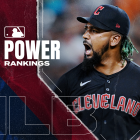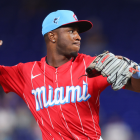Baseball's current collective bargaining agreement is set to expire Thursday, and the owners have already mentioned the possibility of a lockout if the two sides do not agree to terms. Obviously neither MLB nor the MLBPA wants a work stoppage after 21 years of labor peace. There's too much money to be lost.
One of the most significant issues still on the table is an international draft, which the owners have wanted for years because it will help them cut costs. The players union usually has no problem negotiating away the rights of amateurs -- international free agents are not union members and do not become members until being added to the 40-man roster -- but this is different. The MLBPA has strongly opposed an international draft.
When MLB and the MLBPA resumed CBA talks Monday, the union reportedly brought in several prominent Latin American players to attend the bargaining session.
Sources: A significant number of Latin American players are expected at MLB/MLBPA bargaining session today to fight the international draft.
— Jeff Passan (@JeffPassan) November 28, 2016
Latin representation at union meetings has been an issue in the past. An issue as divisive as the int'l draft spurred interest from players.
— Jeff Passan (@JeffPassan) November 28, 2016
This is a very bold move by the MLBPA. They're effectively drawing a line in the sand. By bringing in prominent Latin American players, who have the greatest reason to oppose an international draft, the union is saying they won't back down. They're not going to cave in and allow an international draft with all those players in attendance.
In recent weeks several Latin American players have posted videos on social media speaking out against an international draft. Among them are Nelson Cruz, Edwin Encarnacion and Gary Sanchez.
Others like Jose Reyes, Carlos Santana, Carlos Carrasco, Miguel Sano, Willson Contreras, Pedro Strop and Ivan Nova have released similar videos.
Under the current CBA, each team is given a bonus pool to spend on international amateurs each year. The pool sizes are based on reverse order of the standings, so the worst teams get the most money. In recent years several teams have exceeded their bonus pool substantially, accepting the penalty (a tax and limits on future bonuses) in exchange for a one-year talent windfall.
Once that happened and clubs essentially made a mockery of the system, MLB was going to push for an international draft even harder. One proposal reportedly includes a 10-round draft for players age 18 and over. At the moment, international players are eligible to sign at 16. Anyone over the age of 23 is considered a true free agent and isn't subject to the spending pools.
As noted by Ben Badler, Baseball America's international guru, an international draft is not necessary a response to big market teams hogging all the top talent. In 2011, the final year before the bonus pools were introduced, many of the highest spending teams internationally were small market clubs:
The last full calendar year without international bonus pools was 2011. These were the top 10 spenders that year: https://t.co/AvfGodX2F9pic.twitter.com/ghhPXC279w
— Ben Badler (@BenBadler) November 28, 2016
The highest spending team during the 2016-17 international signing period, which opened July 2, has been the Padres. They've signed seven of MLB.com's top 30 international prospects for a combined $29 million. Their bonus pool was a mere $3.35 million.
A draft would not only limit the earning potential of international amateurs -- they'd have little leverage because they'd only be allowed to negotiate with the team that drafts them -- but there is also concern it would push athletes to other sports, like basketball and soccer. When you limit their earning potential for baseball, they'll look for those paydays elsewhere.
Puerto Rico, while still a bountiful baseball hotbed, has seen a noticeable decline in baseball talent since being added to the annual amateur draft in 1990. Puerto Rican officials have petitioned to MLB to remove the island's players from the draft for years, but have not had any success.
For what it's worth, MLB is said to be backing off their demand of an international draft, perhaps because Latin American players got involved in the negotiations.
Sources: Owners have backed off the international draft as a requirement for a new collective-bargaining agreement.
— Ken Rosenthal (@Ken_Rosenthal) November 29, 2016
At the end of the day, an international draft solely benefits the owners. The players are hurt by losing negotiating leverage and the teams themselves would be hurt by no longer being able to pursue any international amateur.


















